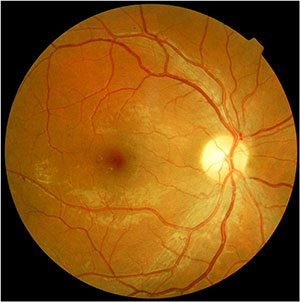
What is Macular Edema?
Macular edema refers to the swelling or thickening of the macula, the central part of the retina (light receptive tissue of the eye). Macular edema occurs when fluid leaks from retinal blood vessels and accumulates in a very small area of the macula that is rich in light receptive cells.
The macula is responsible for sharp central vision required to read, drive, sew or recognize a face. Typical symptoms of macular edema are blurred central vision or distorted vision (straight lines may look wavy). If left untreated, this condition can cause severe vision impairment or even blindness.
Risk Factors of Macular Edema
The exact cause of macular edema is not known. However, the risk of developing macular edema increases with the following:
- Increased age
- Inflammatory eye conditions (such as with uveitis)
- Eye surgery
- Diseases such as Diabetes (diabetic retinopathy) and Hypertension (high blood pressure)
- Injury or trauma to the eye
- Side effects from certain medications
- Certain genetic disorders such as retinitis pigmentosa
Diagnosis of Macular Edema
To diagnose macular edema, the doctor will instill eye drops and dilate your pupils to view the retina. A significant test called fluorescein angiography is performed that uses a special dye to illuminate areas of the retina to evaluate the blood vessels. Another diagnostic test is optical coherence tomography (OCT) which uses a laser camera to capture pictures of the retina, measure its thickness and detect swelling and fluid accumulation.
Treatments for Macular Edema
Various treatment modalities are available and these include:
- Topical and oral medications: Non-steroidal anti-inflammatory drugs (NSAIDS), Corticosteroids and Carbonic Anhydrase Inhibitors (CAI)
- Intravitreal (inside an eye): Anti-VEGF
- Immunomodulatory therapy (modifying or regulating immune functions)
- Surgical: vitrectomy or focal laser surgery
- If macular edema is caused due to diabetes (most common cause) or retinal vein occlusion, laser treatment is often used to treat the swollen macula.
Related Topics
- Retinal Detachment
- Retinal Tear
- Diabetic Retinopathy
- Age-Related Macular Degeneration
- Retinal Vascular Diseases
- Retinal Artery Occlusion
- Retinal Vein Occlusion
- Retinal Hemorrhage
- Vitreous Hemorrhage of any Etiology
- Central Serous Retinopathy
- Posterior Vitreous Detachment
- Vitreomacular Traction Syndrome
- Epiretinal Membrane
- Macular Edema
- Macular Hole
- Retinoschisis
- Ocular Ischemic Syndrome
- Cystoid Macular edema
- Color Blindness
- Nyctalopia/Night Blindness
- Cone Dystrophy
- Choroideremia
- Retinopathy of Prematurity
- Uveitis & Ocular Inflammation
- Retinoblastoma

